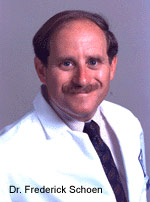
Our heart pumps about 2,000 gallons of blood each day. Our heart valves ensure all that blood moves in the right direction. When a heart valve fails, the heart must work harder to keep organs properly nourished. If the heart works too hard, it can begin to weaken and fail.
Malfunctioning heart valves can be replaced with animal or synthetic valves, but these have limited life spans. In podcast #4, Dr. Frederick Schoen describes how regenerative medicine researchers are laying the foundation for working heart valves made of natural materials that won’t wear out before we do, and that can even grow along with the young patients they might help. Dr. Schoen’s own work in developmental biology, examining how an embryo successfully “engineers” a heart valve as it grows, is an important part of this effort.
Frederick J. Schoen, MD, PhD, is a professor of pathology and health sciences and technology at Harvard Medical School and Brigham & Women’s Hospital.
For more information about Dr. Schoen’s work, see his click here.
For more information about the McGowan Institute for Regenerative Medicine, visit:
McGowan Institute Research Site
McGowan Institute Patient Site
McGowan Institute on Facebook


